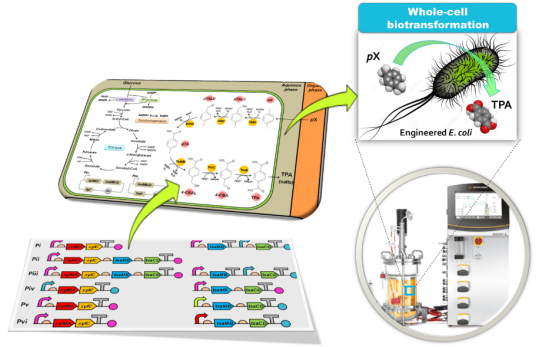Distinguished Prof. Sang Yup Lee and his team have established a novel and efficient biocatalysis system to produce terephthalic acid (TPA) from p-xylene (pX). This biocatalysis system is a greener and more efficient alternative to the traditional petro-chemical methods for TPA production.
Prof. Lee’s team exploited a metabolic engineering and synthetic biology joint approach to develop a recombinant microorganism capable of oxidizing pX to TPA by microbial fermentation. TPA is a globally important commodity chemical necessary for manufacturing polyethylene terephthalate (PET). It is applied in making plastic bottles, clothing fibers, films, and many other products. Currently, TPA is produced from pX oxidation through an important industrial chemical process, known as the Amoco process, which accounts for nearly all TPA production worldwide with a typical TPA yield of over 95 mol%. However, this petroleum process has drawbacks including intensive energy input at high temperature and pressure, usage of heavy metal catalysts, and unavoidable byproduct formation of 4-carboxybenzaldehyde.
In this research, Prof. Lee’s team rationally designed and constructed a synthetic metabolic pathway converting pX to TPA, by incorporation of the upper xylene degradation pathway of Pseudomonas putida and the lower p-toluene sulfonate pathway of Comamonas testosteroni. The newly constructed pathway was then optimized to yield a final E. coli strain showing high TPA production with minimal byproduct formation. With the best-performing strain, Prof. Lee’s team innovated an elegant two-phase (aqueous/organic) fermentation platform for TPA production on a larger bioreactor scale. The two-phase design was adopted to overcome problems associated with the use of volatile, insoluble, and toxic pX for feeding the bacteria to produce TPA. Industrial grade oleyl alcohol (OA) was used as the organic carrier of pX. After process optimization, 13.3 g of TPA was produced from 8.8 g of pX, corresponding to an extraordinary yield of 97 mol%.
The team has developed a microbial biotechnology application that is reportedly the first successful example of bio-based production of TPA by microbial fermentation of engineered E. coli. This bio-based TPA technology presents several advantages over traditional petro-chemical processes, such as ambient reaction temperature and pressure, no use of heavy metals or other toxic chemicals, and removable byproduct formation, and most importantly, it is 100% environmentally compatible.

Prof. Sang Yup Lee (Department of Chemical and Biomolecular Engineering)
Homepage: http://mbel.kaist.ac.kr
E-mail: leesy@kaist.ac.kr






